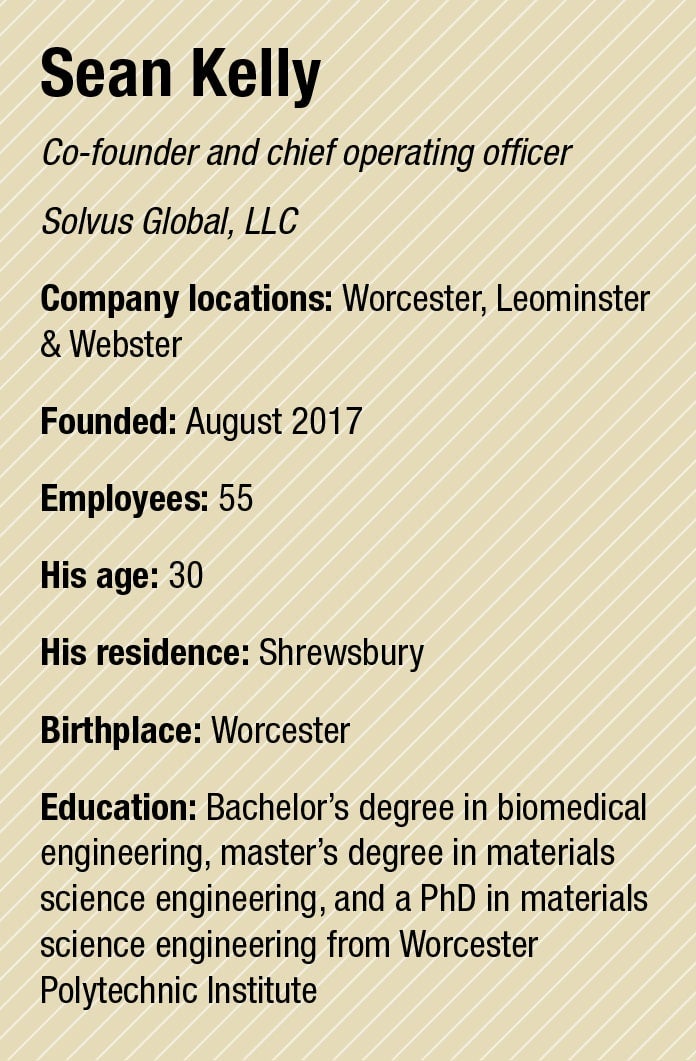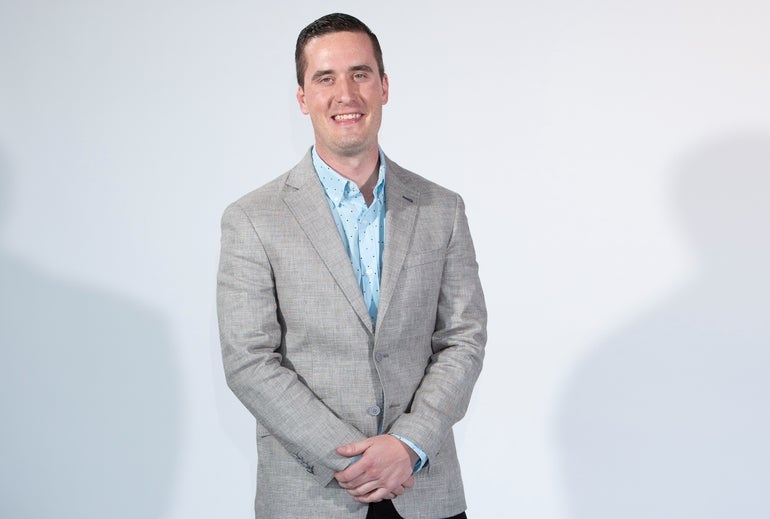Newlywed Sean Kelly co-founded Solvus Global with Aaron Birt to research solutions to problems plaguing the business world, by spinning off companies addressing those specific needs.
Get Instant Access to This Article
Subscribe to Worcester Business Journal and get immediate access to all of our subscriber-only content and much more.
- Critical Central Massachusetts business news updated daily.
- Immediate access to all subscriber-only content on our website.
- Bi-weekly print or digital editions of our award-winning publication.
- Special bonus issues like the WBJ Book of Lists.
- Exclusive ticket prize draws for our in-person events.
Click here to purchase a paywall bypass link for this article.
Newlywed Sean Kelly co-founded Solvus Global with Aaron Birt to research solutions to problems plaguing the business world, by spinning off companies addressing those specific needs. Fresh off spinning out that first company, Solvus has nearly doubled its employee base as the company aims to tackle the big-picture issues impacting humankind.
How has the company grown in the last year?
In terms of personnel, we’ve grown from 30-35 employees at the end of 2021 to having 55 employees today. Our programs through our government funding and our business model are coming to fruition. We are looking to spin out companies into stand-alone entities.
How do you start those spinoff companies?
We call them wells of opportunity that are under the Solvus umbrella. We start with Solvus doing research on a concept, checking the viability of both the research and its ability to stand on its own from a business standpoint. We then start them as standalone companies.
We just officially executed our first spinoff company, Valis. That is our recycling technology, where the goal is to make scrap metal recyclers as much profit as possible. Another two to three more spinoff companies are coming in 2023, with divisions like Mammoth Metalworks, which has to do with large-scale metal additive manufacturing, and Apex, which is our manufacturing intelligence software.

Why is Solvus organized like this?
That is the business model. We want to identify pressing problems that need solving, and we pay for that by liquidating our spinoff companies.
Right now, we have primarily been funded by the U.S. Department of Defense, but the plan is for us to liquidate the spinoff companies and then fund further research using that money. We will liquidate companies through mergers and acquisitions, IPOs, and outright sales.
The founders of Solvus retain an equity stake in the spinoff companies, and a big piece of our model for our employees is our incentive structure. Employees and shareholders inside the Solvus system benefit from the new companies.
We are aiming to average two or three spinoffs per year within the next two to four years, once we are moving along that process efficiently.
How do you identify problems that need Solvus research?
Water purification, food scarcity, world hunger; these are the things we dreamt about going after when Solvus was first started.
The National Academy of Engineering has a list of Grand Engineering Challenges for the 21st Century, which has issues like making solar power economical, reverse engineering the brain, and providing access to clean water. I wouldn't be surprised if we could try to tackle the majority of those issues. Those are a bit of a North Star for us.
A major push right now is getting into technologies that address climate change, not just clean energy but making the way we do things more environmentally friendly. We’re looking at developing materials in a more sustainable way and addressing process inefficiencies.
Sounds like you have some big ideas.
Aaron wants to develop ways to mine asteroids for materials.
Are you able to find all the staff you need?
We see the sweet spot with Solvus to be right around 100 employees. By the end of 2022, we hope to be between 65 and 75.
You can’t just post every position to Indeed or those general job boards. You need to take advantage of the local talent pool, and we rely on the universities like Worcester Polytechnic Institute and Quinsigamond Community College and even the local technical schools.
We try to touch base with applicants very quickly. We want to make sure we open up the conversation early, as we know they’ll probably be contacted by other employers. We’ve been lucky with the hires we made, as they have a high talent level.
Everything at Solvus starts with the team. We start with bringing on great people first. Our business model and our goals as a company are efforts that take more than two to three brains working on everything. Having people buy in on the ultimate model will be key to our success.
And I heard you just got married.
Yep! We got married on Oct. 1. We’ve been planning it for a while, but the few weeks leading up to the wedding were crazy.
I met my bride, Ashlynn Petersen, while she was working at a bar in Worcester, and I was waiting for my takeout lunch to be ready across the street. We started talking, and it grew into this awesome relationship.
She’s very patient with all things Solvus, and I wanted to give her all the support she needed to make our special day particularly memorable and special for her.
This interview was conducted and edited for length and clarity by WBJ editor Brad Kane.

